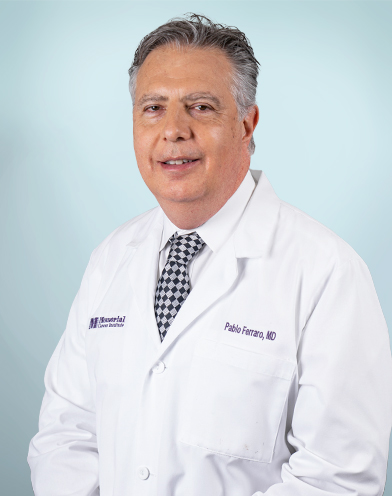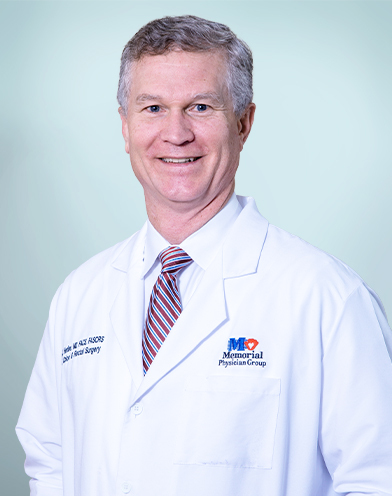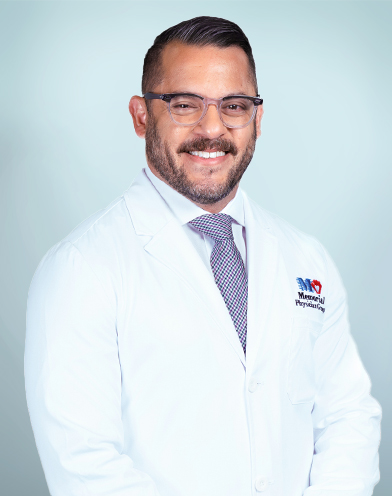Rectal Cancer Care
Our dedicated team provides early detection and gentler therapies to improve your quality of life.
We offer a team approach and deliver innovative surgical techniques, promising new chemotherapy agents and radiation therapy. Your care includes special services that ease discomfort and boost your emotional well-being. Our expertise and comprehensive approach give hope to patients from across the region.
Diagnosing Rectal Cancer
Timely rectal cancer treatment gives you better chances for healing and potential cure. This is why we see new patients quickly. Many patients undergo expert consultation and imaging during the same visit. Other studies, such as a rectal ultrasound or flexible sigmoidoscopy, can also help us detect early-stage rectal cancer. We are among the few programs in the region with rectal ultrasound expertise for a more precise diagnosis.Evaluations may also include blood tests and a procedure to take a tissue sample (biopsy). Pathologists specializing in rectum cancer review tissue samples to determine whether the cells are cancerous. Cancer geneticists also review the biopsy to check for gene and protein mutations.
Rectal Cancer Treatments and Support
Our experts take extra steps to optimize outcomes. If other medical issues could complicate your recovery, we help get them under control. We recommend smoking cessation for people who use tobacco. Your pre-surgery care may also include light physical activity to strengthen your cardiovascular system and immune system-boosting drinks.
We routinely use minimally invasive surgical techniques. Robotic technologies extend the reach
and precision of the surgeon’s hands. Laparoscopic procedures involve small incisions instead of large ones. Our enhanced recovery program gets many patients back on their feet shortly after surgery so they can go home sooner.
Medical oncology or radiation oncology are routinely part of your rectal cancer care plan. These treatments shrink large tumors before surgery and can prevent cancers from returning after treatment. If you are too sick for surgery, they relieve discomfort and slow cancer progression.
We offer the highest level of care, including clinical trials assessing novel medical therapies. Our radiation oncology program maintains prestigious American College of Radiology (ACR®) accreditation for our commitment to safety and quality.
Supportive Therapies and Services for Rectal Cancer
We offer a range of services that can ease some of the worry and discomfort you may be experiencing. Offerings include nutrition counseling and integrative medicine practices, like massage therapy. If you have an ostomy (a hole in the abdominal wall through which stool exits the body), specially trained nurses show you how to care for it and provide support between appointments. Read more about our cancer support services.
Rectal Cancer Care: Why Choose Memorial Cancer Institute?
The rectum is a complex organ located in a tight space with other delicate structures nearby. It’s essential to see doctors who are trained to diagnose and treat rectum cancer, such as those at Memorial. Our nationally recognized surgeons guide your care. They work with other highly skilled specialists to deliver exceptional treatment close to home.
Highlights of our program include:
- Collaborative approach: You have access to all the specialists you need in one program. Surgeons work alongside doctors specializing in chemotherapy, radiation therapy, imaging and pathology. We regularly communicate about treatment plans and progress, enabling us to tailor care to your needs. Meet our team.
- Cancer genetics: We have uncommon expertise in South Florida. Genetic testing identifies people at higher risk of rectum cancer. We then perform ongoing monitoring to catch it in earlier stages. When there’s a rectal cancer diagnosis, we check for mutations that require specific medical therapies. Find out more about cancer genetics.
- Tailored care: You receive a personalized care plan that’s tailored to your medical needs and individual preferences. When considering surgery, we determine whether you are healthy enough for a procedure.
- Surgical excellence: We are at the forefront of minimally invasive rectum cancer surgery, which is gentler on your body. Surgeons often access the rectum by passing instruments through the anus instead of making a large incision. For rectal cancers near other pelvic organs, we coordinate with urologists or gynecologists to carry out your procedure.
- Focus on quality of life: We successfully remove cancers even if they are difficult to reach (very low in the rectum and close to the anus). We may reconnect the remaining tissue to the digestive tract, preserving your ability to have bowel movements. This method helps you avoid a permanent ostomy.















